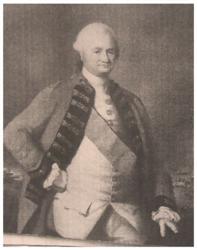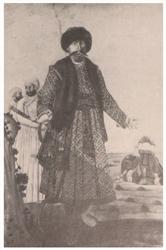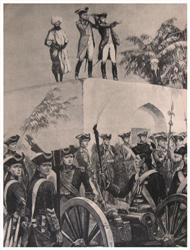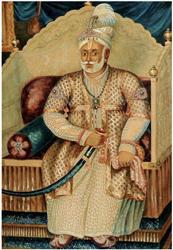The root of the English strikes deeper in India after the Battle of Plassey.
Marthanda Varma passed away.
Heirs advised not to quarrel with the English.
The Industrial Revolution in England.

History is the tale too of sadness and success.Events are the stimulating force of history.Like the waves of the sea events emerge out by and by. Sadness and happiness come by and by at these events. Dupleix came over Pondichery with great energy and potentiality as French governor.He crumbled enemies by taking by storm at Carnatic. But with the Second Carnatic War his majesty ended. Louis XV ordered his recall. In October 1754, pained and dishonoured he embarked on the ship for his voyage to France. But, a youth arrived in India with the eyes of eagle and the cunningness of a fox. It was Robert Clive who was an ordinary scribe in the payroll of the English East India Company. Leading a small group of Sepoys of 200, he exhibited a new war strategy at the Second Carnatic War which took the French aback. His eyes were on Bengal then. Like Carnatic, in Bengal, thereafter, internal feuds were on the rise.

In India and Europe the time was the period of intense wars. In 1756 the Seven Years War started with England and France in two mutually opposite camps, it was an explosion the hostilities aimed at establishing suzerainty to open colonies and trade centres outside Europe. The main reason of the war was the revenge Austrian empress Maria Theresa felt towards Frederic II, the King of Prussia. It was the continuation of the Austrian Succession War. In that war England helped Austria while France Prussia. Thus the scenario became the exact opposite. The Seven Years War was started in 1756. It was in the same year that Siraj ud Daula became the Nawab of Bengal in an environment of internal feuds and disputes over right to heirship. Daula was friendlier towards the French. Immediately after the news of the Seven Years War came out in India Robert Clive planned to seize Chandra Nagar. Daula was infuriated because of the attempts of the English to erect a fort in Calcutta. Nawab's order to stop the construction of the fort fell on deaf ears. Then the troops of Nawab made the construction stopped.

Battle
The arrested English men were confined in a room which had no proper light or ventilation. They fell down and died there. It infuriated the British who under the leadership of Robert Clive and Watts locked horns with the forces of Nawab. At last without waiting for long the Nawab and the English signed a treaty and within a short period Clive seized the French settlement at Chandra Nagar. With this the relations between Nawab and the English worsened. Clive then conspired against the Nawab with the help of the Marvadis who were traders at Culcutta.Through them, the Nawab's commander-in - chief Mir Jafar was influenced. The forces of the British and the Nawab met at a place called Plassey in 1757 where the Nawab was killed. Later in tune with the previous plans Mir Jaffer was hoisted as Nawab who gave the Company the Zamindari rights of 24 Parganas. Clive was given costly gifts. Thus the East India Company which came to India just for trade was thus conferred with the right to collect tax from a few places in Bengal. Even though it was a little war it has importance in the history of not only India but the world as a whole, since the Battle was the first threshold of the British in establishing an empire in India.

Maharaja
After the passage of one year of the Battle of Plassey Marthanda Verma of Travancore bid good bye to world. He was a great king who enlarged and broadened the territories of Venad as a power to reckon with, which was confined to a small strip of land between Cape Comerin and Attingal. It was the Dutch who stood as a great stumbling block against the dreams of Marthanda Varma to create a greater Kerala conquering and annexing the countries of Zamorin, Cochin and Kolathu Nadu. But, oddly enough he might have become the emperor of Kerala had there not been a Cochin controlled by the Dutch. He died on 7 July 1758 at the age of 53 in Thiruvananthapuram. Before his demise he called upon his heir and Yuva Raja Karthika Thirunal Rama Varma and gave bits of advice. The most important of which was that the British should not be quarrelled with and the country submitted before the deity Sree Padmanabha should not be taken away. Karthika Thirunal Rama Verma, (Dharma Raja) who became the king in 1758 and ruled over Travancore until 1798, strictly followed every words of his late uncle. Before his rule came to an end the length and breadth of India was brought under the flag of the British Empire. The tales of wars and the strategies and cheatings that led to the ultimate formation of the British Raj became very popular.
A new awakening was created in England in the socio-economic domain thanks to the Agro-Industrial Revolution making use of the raw materials brought to that country from other nations. It enriched not only the domains of industry but also the arenas of the discoveries of scientific equipments. The Agro-Industrial Revolution of England began to spread to other countries.
